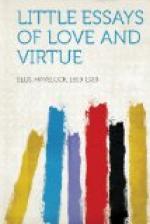The practices and the ideals of this established morality were both due to men, and both were so thoroughly fashioned that they subjugated alike the actions and the feelings of women. There is no sphere which we regard as so peculiarly women’s sphere as that of love. Yet there is no sphere which in civilisation women have so far had so small a part in regulating. Their deepest impulses—their modesty, their maternity, their devotion, their emotional receptivity—were used, with no conscious and deliberate Machiavellism, against themselves, to mould a moral world for their habitation which they would not themselves have moulded. It is not of modern creation, nor by any means due, as some have supposed, to the asceticism of Christianity, however much Christianity may have reinforced it. Indeed one may say that in course of time Christianity had an influence in weakening it, for Christianity discovered a new reservoir of tender emotion, and such emotion may be transferred, and, as a matter of fact, was transferred, from its first religious channel into erotic channels which were thereby deepened and extended, and without reference to any design of Christianity. For the ends we achieve are often by no means those which we set out to accomplish. In ancient classic days this moral order was even more severely established than in the Middle Ages. Montaigne, in the sixteenth century, declared that “marriage is a devout and religious relationship, the pleasures derived from it should be restrained and serious, mixed with some severity.” But in this matter he was not merely expressing the Christian standpoint but even more that of paganism, and he thoroughly agreed with the old Greek moralist that a man should approach his wife “prudently and severely” for fear of inciting her to lasciviousness; he thought that marriage was best arranged by a third party, and was inclined to think, with the ancients, that women are not fitted to make friends of. Montaigne has elsewhere spoken with insight of women’s instinctive knowledge of the art and discipline of love and has pointed out how men have imposed their own ideals and rules of action on women from whom they have demanded opposite and contradictory virtues; yet, we see, he approves of this state of things and never suggests that women have any right to opinions of their own or feelings of their own when the sacred institution of marriage is in question.
Montaigne represents the more exalted aspects of the Pagan-Christian conception of morality in marriage which still largely prevails. But that conception lent itself to deductions, frankly accepted even by Montaigne himself, which were by no means exalted. “I find,” said Montaigne, “that Venus, after all, is nothing more than the pleasure of discharging our vessels, just as nature renders pleasurable the discharges from other parts.” Sir Thomas More among Catholics, and Luther among Protestants, said exactly the same thing in other and even clearer words, while untold millions of husbands in Christendom down to to-day, whether or not they have had the wit to put their theory into a phrase, have regularly put it into practice, at all events within the consecrated pale of marriage, and treated their wives, “severely and prudently,” as convenient utensils for the reception of a natural excretion.




